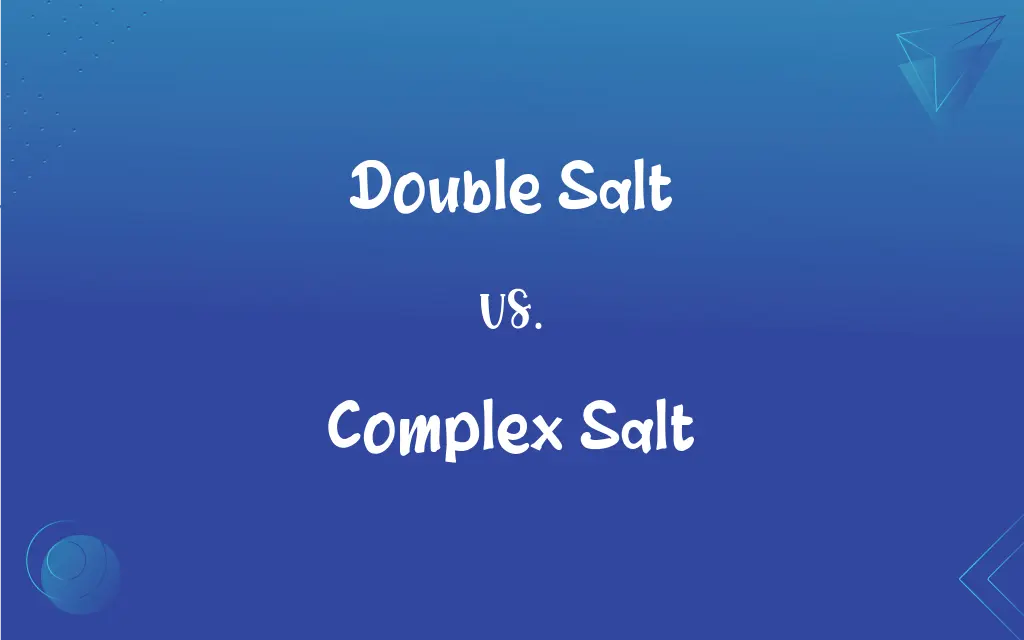Double Salt vs. Complex Salt: What's the Difference?
Edited by Janet White || By Harlon Moss || Updated on October 18, 2023
Double salts are formed from two different salts and dissociate completely in solution; complex salts form coordination compounds and don't fully dissociate.

Key Differences
Double salts and complex salts represent two unique categories within the world of salts, with distinct properties and behavior.
Double salts arise when two distinct simple salts crystallize together in a fixed stoichiometric ratio but remain as individual entities. When dissolved in water, double salts disintegrate entirely into their constituent ions.
Conversely, complex salts consist of a central metal atom or ion bonded to one or more ligands, forming coordination compounds. When a complex salt dissolves, not all its bonds break only certain ions dissociate, leaving the central atom/ion with its attached ligands intact.
So, while double salts present themselves as a mixture of two salts, complex salts introduce a coordinated entity in their structure. Another way to discern them is by examining their behavior in aqueous solutions: double salts offer a full spectrum of ions from their parent salts, while complex salts retain a part of their structure, releasing only some ions.
Comparison Chart
Composition
Two different salts in a fixed ratio.
Central metal ion bonded to ligands.
ADVERTISEMENT
Dissociation in Water
Fully dissociates into its constituent ions.
Partially dissociates; some structure remains intact.
Examples
Mohr's salt, Rochelle salt.
[Cu(NH3)4]SO4, [Fe(CN)6]^(3-).
Structural Characteristic
No coordination between metal ions and ligands.
Features coordination between metal ions and ligands.
Behavior in Solution
Behaves as a mix of its two constituent salts.
Behaves uniquely due to its retained coordinated entity.
Double Salt and Complex Salt Definitions
Double Salt
Contains ions from two original salts without coordination.
Double salts disintegrate completely, revealing the ions of both parent salts.
ADVERTISEMENT
Complex Salt
A salt where a central metal ion is bonded to one or more ligands.
The compound [Cu(NH3)4]SO4 is a complex salt.
Double Salt
A salt that fully dissociates into its constituent ions in solution.
When dissolved, the double salt releases all its ions.
Complex Salt
Contains a metal atom/ion and ligands in a distinct arrangement.
[Fe(CN)6]^(3-) is a classic example of a complex salt.
Double Salt
A compound formed by the combination of two different salts.
Mohr's salt is an example of a double salt.
Complex Salt
A coordination compound that partially dissociates in solution.
In water, a complex salt may retain its central metal-ligand bond.
Double Salt
A crystalline entity with two distinct simple salts.
Rochelle salt is another widely recognized double salt.
Complex Salt
Forms when ligands coordinate to a metal ion.
Complex salts exhibit unique colors due to their metal-ligand bonds.
Double Salt
A compound with a fixed stoichiometric ratio of two salts.
The unique ratio of salts in a double salt determines its properties.
Complex Salt
A compound where not all ions dissociate in solution.
Complex salts retain some structure when dissolved, unlike double salts.
FAQs
Do double salts fully dissociate in water?
Yes, double salts fully dissociate into their constituent ions in water.
Can you give an example of a double salt?
Mohr's salt, a combination of iron sulfate and ammonium sulfate, is an example.
Can a compound be both a double salt and a complex salt?
While both are salts, they're distinct categories; a compound typically belongs to one or the other.
What's the main composition difference between double and complex salts?
Double salts consist of two distinct salts, while complex salts have a metal ion bonded to ligands.
What remains intact in a solution of complex salt?
In complex salts, the metal-ligand bond remains intact in solution.
Are the properties of double salts unique?
No, they're typically a combination of the properties of their constituent salts.
How are double salts formed?
Double salts form when two salts crystallize together in a fixed ratio.
Can double salts be found in nature?
Yes, some double salts can be found naturally in mineral deposits.
Why are some complex salts colored?
The color arises due to electronic transitions within the metal-ligand complex.
Are complex salts used in medical applications?
Yes, some complex salts are used in medicine for various purposes.
What's a key feature of complex salts?
A central metal ion coordinated to one or more ligands is a key feature.
Is the ratio of salts in a double salt important?
Yes, the stoichiometric ratio of the two salts in a double salt is crucial.
Do all metal ions form complex salts?
Not all, but many metal ions can form complex salts with suitable ligands.
Are there health implications linked to these salts?
Both can have health implications depending on their constituents and exposure levels.
How can one distinguish between double and complex salts?
Observing their behavior in solution can help distinguish between them.
Do complex salts have applications in industry?
Absolutely, complex salts are used in various industries, including electroplating and dyeing.
Can double salts be synthesized in labs?
Yes, many double salts are synthesized for various research purposes.
Are ligands only organic molecules in complex salts?
No, ligands can be both organic and inorganic entities.
Which is more prevalent in nature, double or complex salts?
Both can be found, but complex ions and their salts have a broader presence in biological systems.
Can complex salts exhibit colors?
Yes, many complex salts have distinct colors due to their metal-ligand bonds.
About Author
Written by
Harlon MossHarlon is a seasoned quality moderator and accomplished content writer for Difference Wiki. An alumnus of the prestigious University of California, he earned his degree in Computer Science. Leveraging his academic background, Harlon brings a meticulous and informed perspective to his work, ensuring content accuracy and excellence.
Edited by
Janet WhiteJanet White has been an esteemed writer and blogger for Difference Wiki. Holding a Master's degree in Science and Medical Journalism from the prestigious Boston University, she has consistently demonstrated her expertise and passion for her field. When she's not immersed in her work, Janet relishes her time exercising, delving into a good book, and cherishing moments with friends and family.































































